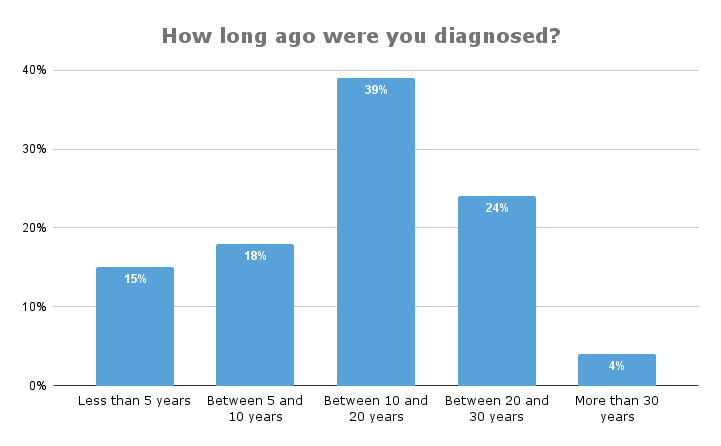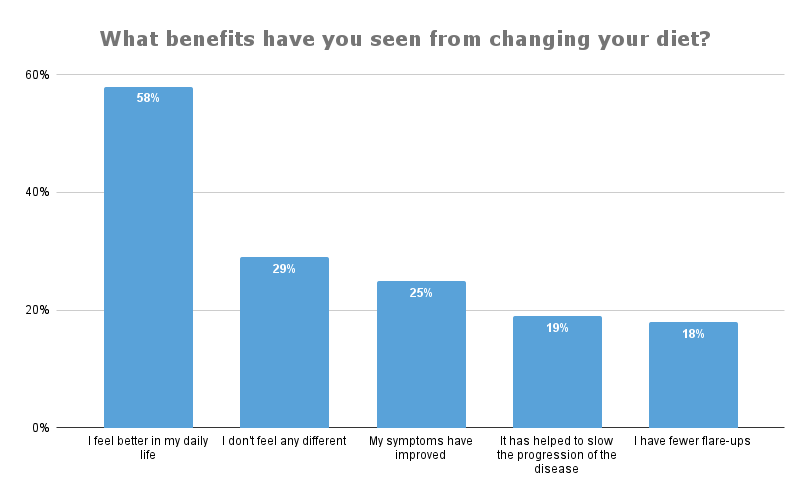Multiple sclerosis: Does diet have an impact on MS? Carenity members share their opinions!
Published Jul 13, 2021 • By Candice Salomé
Multiple sclerosis is a chronic inflammatory autoimmune disease that attacks the central nervous system. In the majority of cases, MS progresses slowly and its progression depends, among other things, on the frequency and severity of flare-ups.
Diet may have a role to play in slowing down the progression of the disease.
But is this true? Could a specific diet slow down the frequency and intensity of multiple sclerosis flares?
We conducted a survey amongst 95 members in France, the United States and the United Kingdom. Discover what they had to say!

95 members responded to our survey in France, the United States and the United Kingdom
We conducted a survey from June 14-30 2021 involving members from the Carenity community who are living with multiple sclerosis in France, the UK and the US. We asked them if their diet had changed since diagnosis.
The average respondent was diagnosed with multiple sclerosis 14 years ago.
More specifically:

100% of respondents have changed their diet since diagnosis
All members interviewed indicated that they have modified their diet since they were diagnosed with multiple sclerosis.
57% have decided to change their diet as a result of researching the disease, 16% have done so on the advice of their doctor and 9% on the advice of other patients.
42% of respondents changed their diet for one of the following reasons:
- Because of a secondary health condition,
- To avoid putting on weight as their activity level decreases,
- As a reflex, because their tastes and digestion has changed,
- For overall well-being.
The benefits that members derive from this change in diet are as follows:

Diet plays a key role in the overall well-being of members affected by multiple sclerosis
The changes that members have made in their eating habits are as follows:
Members are also eating much more fruit and vegetables, most of which are organic and in season. Many have completely eliminated sugar from their diet.
Expert advice on diet for multiple sclerosis patients
So far, there is no scientific evidence to show a correlation between diet and slowing the progression of multiple sclerosis.
However, the medical profession tends to agree that a balanced diet promotes general health.
Thus, for patients with multiple sclerosis, diet contributes to physical well-being and helps prevent the onset of other health conditions.
Experts recommend a varied diet, enriched with fruit and vegetables, and a reduced intake of meat and fat.
Weight gain, as well as bowel and bladder problems, which usually accompany multiple sclerosis, can be positively influenced by diet.
In day-to-day life, the experts recommend the following practices:
- Consume meat no more than twice a week and choose lean meats such as veal, beef, rabbit or lamb.
- Consume a small amount of fats and avoid cold meats.
- Eat 5 fruits and vegetables a day and opt for leafy green vegetables.
- Give preference to vegetable proteins over animal proteins.
- Use heart-healthy oils such as olive oil or canola oil. Avoid sunflower oil, corn oil, safflower oil and grapeseed oil, as well as margarine made from these oils.
- Finally, it is recommended that you drink enough water: around half a gallon per day.
A varied and balanced diet can therefore have a real impact on the general well-being of multiple sclerosis patients and reduce the risk of developing a secondary illness.
Was this article helpful to you?
Share your thoughts and questions with the community in the comments below!
Take care!
Data obtained from a Carenity survey conducted in France, the United Kingdom and the United States from June 14-30, 2021.
Sources:
- Alimentation, Société Suisse de la Sclérose en Plaques
- Sclérose en plaques et alimentation, CRC-SEP Nice
- Alimentation : l’équilibre avant tout !, SEP ensemble

 Facebook
Facebook Twitter
Twitter






